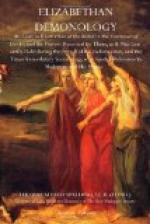94. Every item of Banquo’s description indicates that he is speaking of witches; nothing in it is incompatible with that supposition. Will it apply with equal force to Norns? It can hardly be that these mysterious mythical beings, who exercise an incomprehensible yet powerful influence over human destiny, could be described with any propriety in terms so revolting. A veil of wild, weird grandeur might be thrown around them; but can it be supposed that Shakspere would degrade them by representing them with chappy fingers, skinny lips, and beards? It is particularly to be noticed, too, that although in this passage he is making an almost verbal transcript from Holinshed, these details are interpolated without the authority of the chronicle. Let it be supposed, for an instant, that the text ran thus—
Banquo. ... What are these So withered and so wild in their attire,[1] That look not like the inhabitants o’ th’ earth, And yet are on’t?[2] Live you, or are you ought That man may question?[3]
Macbeth. Speak if you can, what are you?
1st Witch. All hail, Macbeth! hail to thee, thane of Glamis![4]
2nd Witch. All hail, Macbeth! hail to thee, thane of Cawdor![5]
3rd Witch. All hail, Macbeth! thou shall be king hereafter.[6]
This is so accurate a dramatization of the parallel passage in Holinshed, and so entire in itself, that there is some temptation to ask whether it was not so written at first, and the interpolated lines subsequently inserted by the author. Whether this be so or not, the question must be put—Why, in such a passage, did Shakspere insert three lines of most striking description of the appearance of witches? Can any other reason be suggested than that he had made up his mind to replace the “goddesses of Destinie” by the witches, and had determined that there should be no possibility of any doubt arising about it?
[Footnote 1: Three women in strange and wild apparel,]
[Footnote 2: resembling creatures of elder world,]
[Footnote 3: whome when they attentivelie beheld, woondering much at the sight, the first of them spake and said;]
[Footnote 4: ‘All haile, Makbeth, thane of Glammis’ (for he had latelie entered into that dignitie and office by the death of his father Sinell).]
[Footnote 5: The second of them said; ’Haile, Makbeth, thane of Cawder.’]
[Footnote 6: But the third said; ’All haile, Makbeth, that heereafter shalt be king of Scotland.’]
95. The next objection is, that the sisters exercise powers that witches did not possess. They can “look into the seeds of time, and say which grain will grow, and which will not.” In other words, they foretell future events, which witches could not do. But this is not the fact. The recorded witch trials teem with charges of having prophesied what things were about to happen; no charge is more




